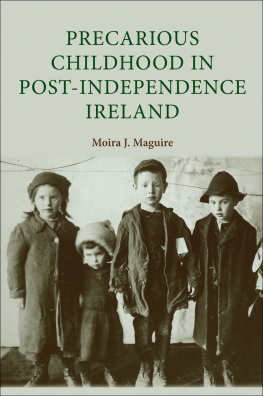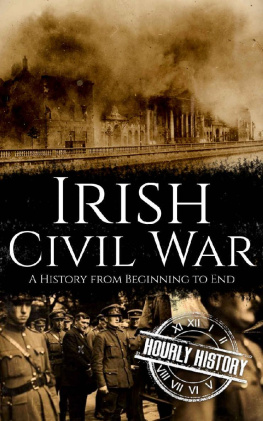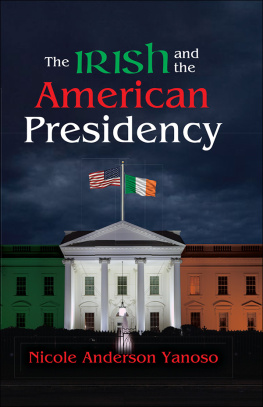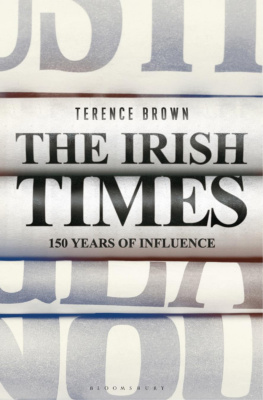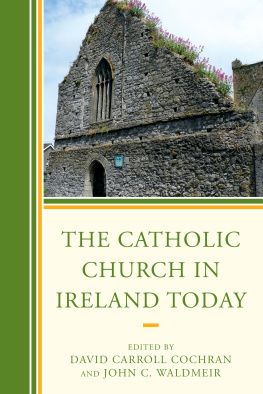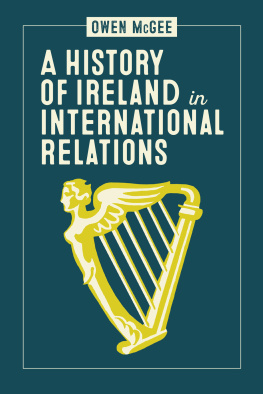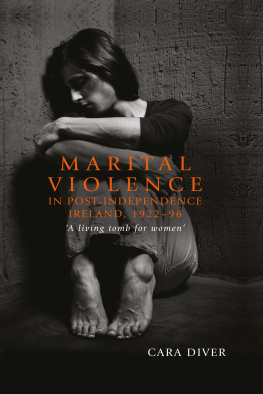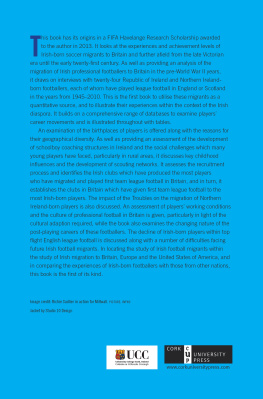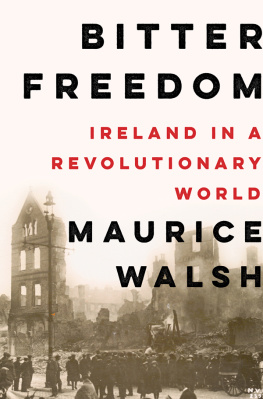Precarious childhood in post-independence Ireland
Precarious childhood in post-independence Ireland
Moira Maguire
Copyright Moira Maguire 2009
The right of Moira Maguire to be identified as the author of this work has been asserted by her in accordance with the Copyright, Designs and Patents Act 1988.
Published by Manchester University Press
Oxford Road, Manchester M13 9NR, UK
and Room 400, 175 Fifth Avenue, New York, NY 10010, USA
www.manchesteruniversitypress.co.uk
Distributed in the United States exclusively by
Palgrave Macmillan, 175 Fifth Avenue, New York,
NY 10010, USA
Distributed in Canada exclusively by
UBC Press, University of British Columbia, 2029 West Mall,
Vancouver, BC, Canada V6T 1Z2
British Library Cataloguing-in-Publication Data
A catalogue record for this book is available from the British Library
Library of Congress Cataloging-in-Publication Data applied for
ISBN 978 0 7190 8081 4
First published 2009
The publisher has no responsibility for the persistence or accuracy of URLs for any external or third-party internet websites referred to in this book, and does not guarantee that any content on such websites is, or will remain, accurate or appropriate.
Edited and typeset
by Frances Hackeson Freelance Publishing Services, Brinscall, Lancs
Printed in Great Britain
by TJ International Ltd, Padstow
Contents
Acknowledgements
This book has its roots in a doctoral dissertation completed at American University, Washington DC in 2000, although it has undergone a drastic transformation since then. Thanks, therefore, must go to the people who were part of the original project. Vanessa Schwartz and Eileen Findlay provided feedback and support and helped me to see the dissertation to fruition. Gail Savage and Liz Sheehan shared their time and insights with me at critical stages of the process. And Liz Stewart provided friendship and encouragement when it was most desperately needed.
I had the good fortune to spend six years living, researching, and teaching in Ireland, and the intellectual community I found there was instrumental to this work. Professor Vincent Comerford welcomed me into the Department of Modern History at National University of Ireland, Maynooth and was unbelievably generous in sharing his time, insights, and feedback. He has been a constant and unflagging supporter of my work, and a steady source of encouragement and absolute conviction in the value of this work. Without his support, kindness, and generosity this book may never have been completed. Ann Matthews has been a stalwart supporter and fellow traveler on the intellectual journey that led to this book. Her friendship, warmth, generosity, and encyclopedic knowledge never cease to amaze me.
The transformation that occurred between the dissertation and this finished product would not have been possible without access to archival and other material made possible by my participation in a research project commissioned by the Irish Sisters of Mercy. I am most grateful to Seamus OCinneide for taking me on as his assistant and colleague. He was a generous and insightful colleague who has contributed enormously to the finished product that is this book. I also owe a debt of gratitude to the law firm of Arthur OHagan who provided material support and helped pave access to archival material that might otherwise have been inaccessible to me.
My UALR colleagues Laura Smoller, Kristin Mann, and Charlie Bolton have provided conversations and encouragement that kept me going through the arduous process of whipping the manuscript into shape. My parents, Patricia and Dexter Merry, have been a constant source of support and encouragement (and lots of bragging). Their love and support mean more to me than they know. Many others have contributed to this book in ways both big and small. I cannot possibly name everyone here, but I am grateful to everyone who has shown an interest in my work over the years, who has encouraged me, and who promised to buy the book when it was finished.
Some of the research for this book was supported by a post-doctoral fellowship from the Irish Research Council for the Humanities and Social Sciences. I am grateful for that support, which allowed me a full year to immerse myself in some critical sources.
Finally I would like to thank Emma Brennan and the anonymous Manchester University Press readers whose comments and feedback were invaluable in shaping the finished product. Any errors, omissions, or oversights are, of course, entirely my own.
Introduction
The Democratic Programme of the First Dil, which could be read as a blueprint for the independent Irish states social agenda, acknowledged the concept of public responsibility for the care and well-being of children, not only as the human resources upon which the future social, political, and economic viability of the state rested, but as valued members, in their own right, of post-independence Irish society. Although the role and responsibility of parents was not explicitly mentioned in the Democratic Programme, there is no reason to assume its architects envisioned supplanting parents as the natural carers, protectors, and educators of children. The Democratic Programme could, therefore, be read as a commitment on the part of the state to aid parents in providing for their children, rather than an intention to assume the parental role entirely. It signaled that the independent Irish state would (or intended to) be child-and family-centered.
But the commitments outlined in the Democratic Programme were not enshrined in the 1937 Constitution or in legislative initiatives, so the republican ideal was not translated into specific rights for children or specific responsibilities on the part of the state to aid families. What was enshrined This might appear to be a strong endorsement of childrens rights, but the childrens natural and imprescriptible rights were never clearly defined or supported by legislative initiative. And it would be easy to assume that this prerogative was applied only sparingly, and only against a small number of parents who flagrantly and blatantly abdicated their parental responsibilities. In fact, however, parents were stripped of their parental rights with relative ease, often for no other reason than abject poverty. Others were shamed and humiliated (and rejected) when they sought public assistance to provide for their childrens most basic needs. The way the state put republican ideals and constitutional imperatives into practice reveals the extent to which definitions of childhood, family, and parental roles were politicized to suit a post-independence agenda. Throughout the first two-thirds of the twentieth century lawmakers presented a faade of caring and compassion while their social policies repeatedly ignored the needs and best interests of the neediest of Irish children those who were illegitimate, poor, neglected, and abused.
Life could be precarious for illegitimate children in twentieth-century Ireland, because of poverty and prejudice. But life also could be precarious for legitimate children whose parents were too poor to provide for them adequately, who lost one or both parents to death or desertion, or who were neglected or abused by their parents. Legitimate children were as likely as their illegitimate counterparts to be sent to industrial schools, primarily on the grounds of parental poverty, neglect, death or desertion. Even children who lived at home in a normal family environment experienced endemic poverty and the malnutrition and substandard housing that went along with it, excessive corporal punishment at home and in school that at times bordered on abusive, and sexual abuse that was often covered up. All of this served to mask the gap between the idealized Ireland of republican fantasy, and the reality of everyday life for Irelands poor and marginalized children.

